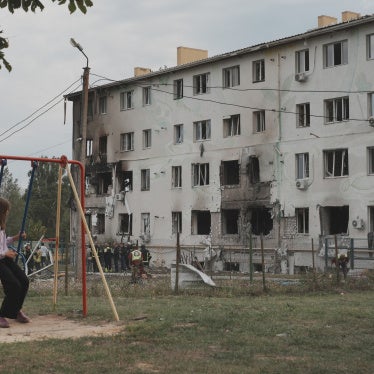MOSCOW. Evening sunlight was slanting through the trees when Vladimir Putin appeared, striding solemnly through the dappled forest toward us. We were 12 representatives of nongovernmental organizations, wondering why we'd been sent into the garden of his dacha to wait for our meeting with him.
It all became clear as the flashbulbs popped and the television cameras began whirring from the patio: a lovely photo-op for Russia's most media- savvy president.
It's a photo-op he needs. His crackdown on Russian nongovernmental organizations is only the latest stroke in an ongoing battle to emasculate the opposition and silence criticism of the Russian state. Before chairing the meeting of the Group of 8 major powers in St. Petersburg next week, he no doubt wanted to demonstrate that he has no quarrel with civil society.
He spent a lot of time making the point. At noon on July 4, he sat for two hours in a conference hall with more than 700 representatives of NGOs from around the world, listening to their comments on the G-8 agenda and responding vigorously - sometimes with remarks like, "I agree with you completely."
That same evening, he engaged in a warm conversation with the 12 of us from international NGOs in a setting of presidential pomp and circumstance designed to wow. We spent three hours talking through climate change, poverty, human rights and terrorism, and even the dreaded new law on NGOs. He told us at one point that he had suddenly got the idea of working for an NGO after he retired.
If so, he'd better hope he doesn't work in Russia. The new law here allows for government interference with the work of NGOs that would be unthinkable in other G-8 countries. It permits Justice Ministry officials, for example, to demand any document from an NGO at any time, without a warrant, and grants them unprecedented discretion in deciding what projects by international NGOs, or even parts of projects, should be banned for not complying with Russia's national interests. Six NGO's have already been denied re-registration based on technicalities, while the cases of another 34 are pending.
When we asked Putin to suspend the law to allow for more consultation with Russian civil society, he answered that "we didn't pass this law in order to repeal it." He agreed to review "sub-laws" that compel NGOs to report the date and subject of news conferences or other activities months before they are supposed to happen. But he also repeated a plain falsehood that he may have the gall to tell his G-8 partners: that Russia had altered the NGO law in accordance with the recommendations of European experts, and that it now differs very little from the European standard. Utter nonsense.
Putin's need to squelch civil society was clear from our conversation about Chechnya. While he insisted the war was basically over and past atrocities committed by Russian troops were being prosecuted, human rights groups report a different picture. The full-force military sweeps in Chechnya may have halted, but active hostilities continue in the south. Hundreds of people have already been abducted this year alone, many are subsequently "disappeared," and Russian prosecutions have proceeded in only a handful of cases.
You don't hear this information on Russian national television or radio - because Putin has neutralized them. You don't hear it in the Russian Parliament - because "political reforms" have produced a compliant Duma. The judiciary is not independent and Russia's governors are now appointed by the president. Civil society remains the biggest political thorn in Putin's side, and he wants to pluck it out.
G-8 leaders must tell Putin that the NGO law does not comport with international standards and must be changed.
Who can deliver that message best? The Russian president made it clear that he considers human rights criticism from the U.S. administration to be a purely cynical exercise in power politics, and it won't have any effect on him. But the Europeans are different, especially Chancellor Angela Merkel of Germany - both because Putin himself lived in Germany (East) as a young intelligence agent, and because Merkel will host the G-8 next year and he clearly sees her as a partner in setting the ongoing G-8 agenda.
Putin's gestures of consideration for NGOs are actually an important message to the whole G-8. He spent much more quality time with us than Prime Minister Tony Blair did in Britain last year, and that sets the bar higher for German officials next year. But it would be tragic if the photo-op obscured the real picture - of an axe that's falling right now on civil society in Russia.
*Carroll Bogert is associate director of Human Rights Watch.







